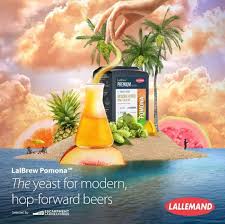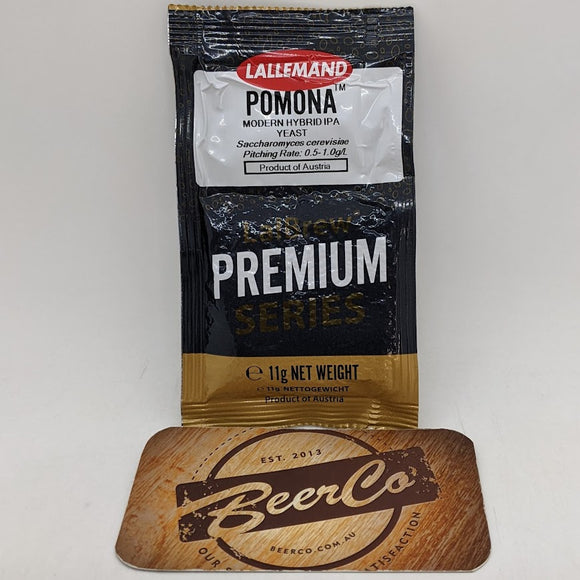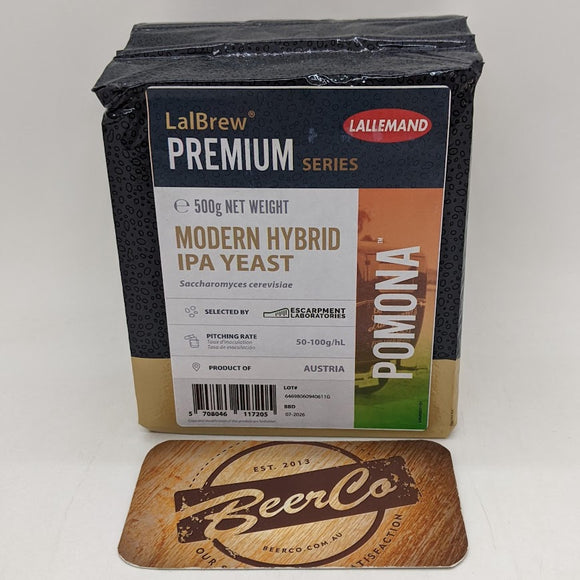LalBrew® Pomona™ is a hybrid yeast that was selected for flavor and fermentation performance in hoppy beers. Named after the goddess of fruit trees, LalBrew® Pomona™ produces a unique and juicy flavor profile with notes of peach, citrus, and tropical fruits. This strain was developed by our partner Escarpment Laboratories (Canada) using advanced yeast breeding and adaptive laboratory evolution in high ABV and highly hopped IPA fermentations. The result is a fruity, stress-tolerant, and robust strain that enhances biotransformation and haze for modern IPA styles.
Pack Sizes:
- 11g Sachet
- 500g Brick
Benefits
Why is LalBrew Pomona™ a game-changer?
Great all-around IPA strain with peach, citrus, and tropical fruit notes plus a stable haze.
- High biotransformation potential
- Unique flavor profile with notes of peach, citrus, and tropical fruits
- Selected for fermentation in high-gravity and highly hopped wort
- Haze-positive for stable haze
- Robust and repitchable
Beer Styles:
- Hop Forward Beers
American Amber Ale, American Barleywine, American Brown Ale, American IPA, American Pale Ale, American Wheat, Berliner Weiss, Blonde Ale, Cream Ale, Dry Stout, Gose, Imperial IPA, Kettle Sours, New England IPA, New England Pale Ale, Robust Porter, Russian Imperial Stout, Session IPA
Aroma:
- Peach, Citrus, Tropical Fruit
Attenuation:
- 75-84%
Fermentation Range:
- 18 - 22°C (64 - 72°F)
Flocculation:
- Medium
Alcohol Tolerance:
- 10% ABV
Pitching Rate:
- 50 - 100g/hL
MICROBIOLOGICAL PROPERTIES:
Classified as Saccharomyces cerevisiae, a top fermenting yeast.
Typical Analysis of LalBrew Pomona™ yeast:
Percent solids: 93% - 97%
Viability: > 1 x 10x9 CFU per gram of dry yeast
Wild Yeast: < 1 per 10x6 yeast cells
Wild Yeast Media: This strain is known to grow on some wild yeast
media including LWYM and LCSM
Diastaticus: Negative
Bacteria: < 1 per 106 yeast cells
Finished product is released to the market only after passing a rigorous series of tests
*See specifications sheet for details
BREWING PROPERTIES
In Lallemand’s Standard Conditions 12°P Wort at 20°C (68°F), LalBrew Pomona™ yeast
exhibits:
Vigorous fermentation that can be completed in 4-5 days.
Medium to high attenuation and medium flocculation
Aromas of peach, citrus, and tropical fruits
This strain is POF negative
Optimal temperature range of 18-22°C (64 - 72°F)
Lag phase, total fermentation time, attenuation and avor are dependent on pitch rate,
yeast handling, fermentation temperature and nutritional quality of the wort.
Flavour and Aroma:

Usage:
The pitch rate will aect the fermentation performance and flavor of the beer. For LalBrew Pomona™ yeast, a pitch rate of 50 – 100g per hL of wort is sufficient to achieve optimal results for most fermentations.
LalBrew® Pomona™ may be re-pitched just as you would any other type of yeast according to your brewery’s SOP for yeast handling. Wort aeration is required when re-pitching dry yeast.
Find your exact recommended pitching rate with our Pitch Rate Calculator the Brewers Corner at www.lallemandbrewing.com
Rehydration:
Rehydration of yeast prior to pitching should be used only when equipment does not easily facilitate dry pitching. Significant deviations from rehydration protocols can result in longer fermentations, under-attenuation and increased risk of contamination. Rehydration procedures can be found on our website. Measure the yeast by weight within the recommended pitch rate range. Pitch rate calculators optimized for liquid yeast may result in significant overpitching.
Storage:
LalBrew® Pomona™ yeast should be stored in a vacuum sealed package in dry conditions below 4°C (39°F). LalBrew® Pomona™ will rapidly lose activity after exposure to air.
Do not use 500g packs or 11g packs that have lost vacuum. Opened packs must be re-sealed, stored in dry conditions below 4°C (39°F), and used within 3 days. If the opened package is re-sealed under vacuum immediately after opening, yeast can be stored below 4°C (39°F) until the indicated expiry date. Do not use yeast after expiry date printed on the pack. Performance is guaranteed when stored correctly and before the
expiry date. However, Lallemand dry brewing yeast is very robust and some strains can tolerate brief periods under sub-optimal conditions.
Dry Pitching:
Dry pitching is the preferred method of inoculating wort. This method is simpler than rehydration and will give more consistent fermentation performance and reduce the risk of contamination. Simply sprinkle the yeast evenly on the surface of the wort in the fermenter as it is being filled. The motion of the wort filling the fermenter will aid in mixing the yeast into the wort.
For LalBrew® Pomona™, there are no significant differences in fermentation performance when dry pitching compared to rehydration.
Rehydration:
Rehydration of yeast prior to pitching should be used only when equipment does not easily facilitate dry pitching. Significant deviations from rehydration protocols can result in longer fermentations, under-attenuation and increased risk of contamination.
Rehydration procedures can be found on our website.
Measure the yeast by weight within the recommended pitch rate range. Pitch rate calculators optimized for liquid yeast may result in significant overpitching.
Further Information and Technical Knowledge Resources:
Yeast Hybridization science
They used yeast breeding to cross a highly aromatic strain with a super robust and reliable strain. Then they used a process called adaptive lab evolution to adapt it to the unique fermentation conditions of IPAs, enhancing biotransformation and haze. The result is an excellent new yeast strain for modern hop-forward beers.
Learn more about yeast hybridization and adaptive lab evolution in this blog article.




